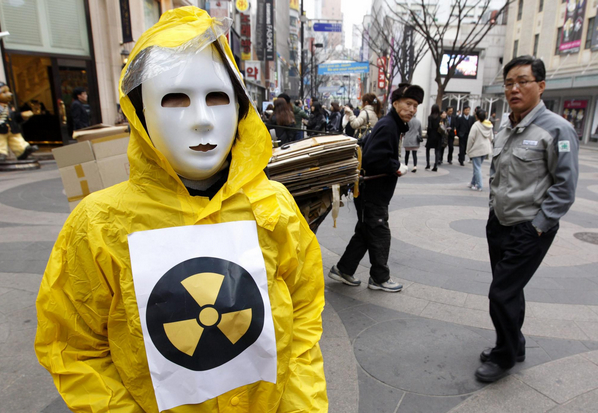Asia
Radioactive iodine detected in Seoul
Updated: 2011-03-29 19:04
(Xinhua)
|
 An environmental activist wears a mask, as part of a rally to protest the building of more nuclear plants in South Korea, in Seoul March 29, 2011.[Photo/Agencies] |
SEOUL -- Traces of radioactive iodine have been detected in Seoul, a state-run nuclear safety agency said Tuesday, a day after the government confirmed minuscule amounts of radioactive xenon-133 in the country's eastern province of Gangwon.
The Korea Institute of Nuclear Safety (KINS) said it had detected traces of iodine-131 in the atmosphere after analyzing air samples collected from its 12 radiation monitoring stations across the country, including Seoul.
The institute said in a statement the amounts were so small that there was no immediate risk to public health or the environment.
However, the public could not hide their growing worries about radiation contamination.
"Miniscule amounts do not pose immediate risk but problems may happen in the next generation. Therefore, I think something must be done immediately," said Cho Ye-seul, 21.
The KINS assumed that the radioactive substance leaked from the stricken Fukushima nuclear power plant in Japan flew to the Kamchatka Peninsula in Russia, circled around the Arctic region and Siberia and moved to South Korea.
The Ministry of Education, Science and Technology said it began to collect air samples from its radiation detection stations across the country on a daily basis. Previously, it conducted the process once a week.
South Korea also plans to carry out extensive safety checks over the next month on all of its own 21 nuclear reactors, which produce 35 percent of the country's electricity.
E-paper

Rise and shine
The Chinese solar energy industry is heating up following recent setbacks in the nuclear sector
Bombs aim for regime change
CSI, with a twist
Literary path
Specials

Peony express
Growers of china's unofficial national flower are reaching out to europe for help

Tea-ing up
More turning to Chinese tea for investment opportunities like vintage wine

A cut above
The ancient city of Luoyang is home to a treasure trove of cultural wonders.




